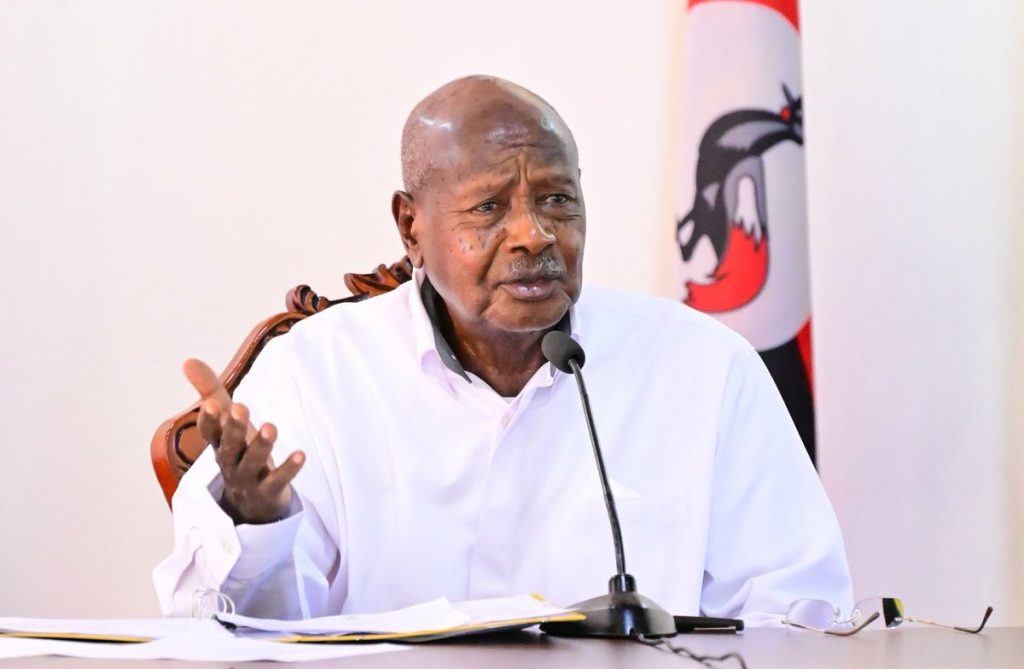
Two Ugandan TikTokers have been detained for allegedly insulting President Yoweri Museveni, First Lady Janet Museveni, and the president’s son, Gen. Muhoozi Kainerugaba, on the popular video-sharing platform. The individuals, David Ssengozi (21), known online as “Lucky Choice,” and Isaiah Ssekagiri (28), were remanded to Kigo prison after appearing before Magistrate Stella Maris Amabilis on Monday.
The two face charges of hate speech and spreading malicious information. According to prosecutors, they posted videos aimed at ridiculing and degrading the first family and certain musicians associated with the governing National Resistance Movement (NRM). They are jointly charged with 19-year-old Julius Tayebwa, who had already been arrested and remanded for similar offenses.
The prosecution claims that the videos posted on TikTok were designed to “ridicule, degrade, demean, and promote hostility” toward President Museveni and his family. Ssengozi, Ssekagiri, and Tayebwa have all denied the charges. Magistrate Amabilis ordered their detention until their next court appearance, scheduled for Wednesday, November 13, 2024. Police had requested their continued detention as investigations into the matter are ongoing.
The case highlights ongoing tensions in Uganda around free speech and the government’s stance on criticism of state officials. In September, police spokesman Rusoke Kituuma had warned that insulting the president, whom he referred to as the “fountain of honour,” was an offense. Kituuma had specifically mentioned the TikTok user “Lucky Choice” as part of an investigation into online content deemed offensive. It remains unclear which specific video led to the arrests, but one widely circulated video posted on the TikTok account “LuckyChoice70” in April titled “My First Enemies” was highly critical of the first family. The video allegedly included sexually explicit language directed at the Musevenis.
This is not the first case involving TikTok videos critical of the Ugandan government. In July 2024, a 24-year-old man was sentenced to six years in prison for insulting the president and his family on TikTok. The man pleaded guilty to the charges and asked for forgiveness, but his case further underscored the increasingly harsh penalties for online dissent in Uganda.
The Ugandan government has faced increasing criticism both domestically and internationally for its crackdown on free expression, particularly on social media. Human rights groups have regularly accused the authorities of stifling dissent and using punitive measures to limit online criticism of government officials. This has drawn condemnation from international organizations, including the US government. A report from the US State Department last year accused Uganda of restricting internet freedom, particularly by imposing criminal penalties on those who criticize the state or its leaders online.
Uganda’s internet restrictions are seen as part of a broader effort to control the flow of information and suppress opposition voices, especially during periods of heightened political tension. In addition to the recent TikTok cases, other incidents in Uganda have highlighted the government’s crackdown on individuals who voice criticism of the state. For example, in 2022, Ugandan author Kakwenza Rukirabashaija was charged with “offensive communication” after making unflattering remarks about President Museveni and Gen. Muhoozi on Twitter. Rukirabashaija was arrested, tortured, and held in custody for over a month before fleeing Uganda to Germany, where he sought asylum.
The Ugandan authorities have defended their stance by arguing that the law is intended to protect public order and prevent the spread of harmful misinformation. However, critics claim that the government uses such laws to stifle dissent and suppress free speech, particularly ahead of elections or during periods of political unrest.
The ongoing arrests and legal actions against individuals like Ssengozi, Ssekagiri, and Tayebwa are part of a broader trend of increasing censorship in Uganda, especially in the online space. Critics argue that the government’s approach is aimed at silencing those who challenge the status quo, using the legal system as a tool to intimidate and punish those who speak out.
As the situation continues to unfold, international human rights organizations are likely to monitor these cases closely, especially in light of growing concerns over the erosion of democratic freedoms in Uganda. The country’s increasingly restrictive policies on internet freedom have raised alarms, particularly for young Ugandans who use social media platforms like TikTok to voice opinions and engage in political discourse.
As these legal battles progress, it remains to be seen how the Ugandan government will respond to the mounting international pressure over its handling of free speech and the growing use of online platforms to challenge political power.







